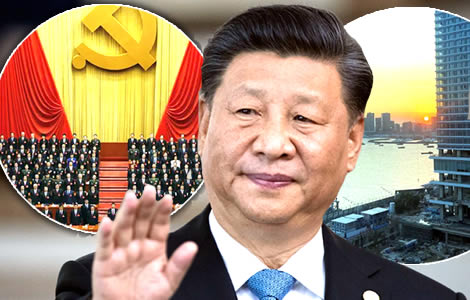For Thailand, the downturn in China has direct implications in terms of economic growth and also the value of the Thai baht which, in the last decade and a half, has mirrored the movement in the Yuan. The kingdom’s economic planners and business sector will be hoping that a more decisive approach will follow the 20th National Congress in Beijing to rectify the disturbing economic picture which has been emerging in recent months.
Chinese authorities in Beijing have moved to censor the research arms of western banks JP Morgan and Goldman Sachs in the capital of the communist country as it approaches its historic 20th National Congress while fears are rising for its economy and, in particular, its collapsing property market which has accounted for over 20% of GDP in the last few decades and is now emerging as a huge asset bubble threatening to collapse.

Amid a worsening property crisis which has seen millions of Chinese mortgage holders refuse to pay back loans and a creeping standstill in construction activity across a dozen of key cities and municipalities, the Communist state, through its Securities Regulatory Commission, has reached out to the leading investment banks asking them not to publish politically sensitive financial information in advance of a historic meeting of the Communist Party on October 16th which is expected to rubber-stamp its economic plan for the next five years and a third term in office for Chinese President Xi Jinping.
However, western analysts are beginning to examine growing property sector concerns in China with a rising level of distressed debt in key companies coming in at $300 billion alone with trillions of dollars in economic activity being threatened by the current crisis which sees property prices falling in over 50% of Chinese cities and the overall price falling by 1.3% in August alone with the most conservative forecast being a 1.5% fall for 2022, a year which has, so far, seen 24.5% of construction activity brought to a standstill.
Potential nightmare for Beijing as a rising number of building sites grind to a halt across the country
That is the current number and a potential nightmare for planners in Beijing is that this number is spiralling upwards at a very fast rate and has increased from just 10% in May.
Millions of workers report being left unpaid for up to 6 months with firms not able to access funding as liquidity in the sector has dried up.
Ratings agency S&P is warning that the ongoing crisis is destroying confidence in the Chinese market while an expert on China has explained that the Chinese economy, unlike democratic countries, is an economy and society not based around individuals but large corporations that have driven its fast-paced and inflated growth for decades.
China’s economy is unlike other countries
Anne Stevenson Yang of J Capital Research in New York in the last week told The Guardian that the response from Chinese authorities only seeks to protect large state-owned enterprises and institutions and therefore falls short of what is needed to address the problem which should be focused on individual households which have been burned by the ongoing catastrophe for instance by giving people access to properties to live in and even, in some circumstances, gifting the properties to them
‘But that’s not of course what is going to happen. The Chinese political system is not built around individuals, it’s built around companies, they are the constituents. The political system operates through them,’ she outlined.
‘China’s property downturn has turned into a crisis of confidence that only the government can fix,’ S&P, the American ratings agency, has explained. ‘If falling sales tip more developers into distressed territory, things will get worse. The distressed firms will halt construction on more pre-sold homes, hitting buyers’ confidence further. Our rough estimate is that about 2 million unfinished homes pre-sold by Chinese developers are now in limbo. This has shattered confidence in this market.’
Chinese market regulator issues censorship order to key financial newspaper The Wall Street Journal in New York not to publish sensitive economic data
The order in Beijing to large western banks this week not to release sensitive research comes after the same state agency issued an order to one of America’s leading financial news publishers, The Wall Street Journal in New York, not to publish sensitive data which the agency baldly claimed was not true.
‘The content you are asking for is not true. Please do not publish,’ was the injunction from the Securities Regulatory Commission which reports directly to China’s State Council and is tasked with maintaining order with China’s increasingly troubled financial markets.
It is not clear how far the remit of the order extends but there are reports from financial analysts and economists with US banks JP Morgan and Goldman Sachs in Beijing having been ordered not to make pronouncements on the state of the Chinese economy at this time.
20th National Congress of the Communist Party takes place in Beijing on the 16th of October. An important event coming at a difficult time for China’s economy
On Sunday, October 16th, the National Congress of the Communist Party will take place in Beijing.
This gathering has been described as perhaps the most significant meeting of the party in two decades and one which the Chinese leadership hopes will cement the power of President Xi Jinping which may give him a more decisive hand in dealing with the country’s stalling economy with fears of an unprecedented contraction of economic activity rising and at best, only 2.8% growth this year.
Underlying the economic unravelling which has seen the Chinese Yuan fall to levels not seen in decades is the steady collapse of the country’s property industry which has accounted for 20% to 25% of GDP in the last few decades based on inflated prices and constant investment with an unlimited flow of capital.
Now, since the US-China trade war and particularly since the pandemic, that flow has been turned off with China’s position, economically in the world, being increasingly isolated leaving the property sector, with millions of unsold homes, roads to nowhere and empty megacities looking like it could be the world’s biggest property bubble to date.
Scale of the rising problem in the property sector is growing and vast with 29.1% of all outstanding loans classified as bad debt in the crippled industry
The scale of this rising problem can be seen by figures released by CitiBank this week showing that 29.1% of all Chinese property debt is now in default and even further than this, can be classified as bad debt.
Thailand, facing a depreciating baht which is using up foreign exchange reserves as the Bank of Thailand revalues its holdings and tries to stem the decline as funds flow to the United States where interest rates by the end of 2022 will be nearly 4.5%.
There is also a concern that a financial implosion in the country’s main economic partner, will also undermine the already weakened Thai currency, Asia’s regional economic outlook and the kingdom’s uneasy and dissipating economic recovery.
China’s influential role in Thai economic growth in the last few decades and the course of the baht as the kingdom’s foreign tourism sector struggles
CitiBank analysts expect that the October 16th conference will be a critically important moment for China and its economy.
Property market collapse in China and a Chinese economic recession is the key threat to Thailand
‘The Congress is set to launch a new political economic cycle,’ a CitiBank report explained some weeks ago. ‘In the near term, it may help reduce policy uncertainty and allow Beijing to refocus on economic development.’
This has implications for Thailand directly in terms of its economic growth prospects and the value of the Thai baht which in the last decade and a half has mirrored the Yuan.
As the Thai foreign tourism industry struggles to recover its past glory, many analysts have pointed to the fact that in the record year of 2019, 28% of Thailand’s foreign tourists were from China.
Apple begins slowly to move out of China
In the meantime, Apple, one of the titans of the US economy which generated $68 billion of its $378 billion in revenue last year from China or 18%, has, like nearly all American manufacturing concerns, begun its move out of the Communist country which had become its primary manufacturing centre, to plants at home in the United States and India but this will take time.
JP Morgan has estimated that by the end of 2022 just 5% of all Apple manufacturing will take place outside China but that by 2025, this will increase to 25%.
US Banks ordered to restrict research, commentary on China’s economy before the Communist Party summit
In Beijing this week, top banks, JP Morgan and Goldman Sachs were not contesting the claims that they have been ordered to restrict their commentary on the Chinese economy before the key meeting in mid-October.
In China, this National Congress is coming amid heightened public dissatisfaction in the country with the governing policies and approach of the Communist Party in a country where any dissent is crushed.
The property crisis and the hardline methods, used by Beijing to control its population, as part of what the Communist Party describes as a zero Covid approach, are fuelling public dissatisfaction which increasingly is manifesting itself in spontaneous protests with underground videos and footage being regularly published outside the Great Chinese Internet Firewall showing crowds being repressed by the state often through the use of non-uniformed security personnel who use indiscriminate physical violence against protesters.
Move to boost liquidity by 843% in the financial system this week by Beijing as Yuan hits 24-year low
In the last week, Communist Party authorities have increased liquidity in the banking system by a massive 843%, something that must eventually impact the value of the Chinese Yuan which is now at a value level not seen against the US dollar in over twenty-four years.
The currency is currently worth ¥144.55 to the dollar. The last time it hit this level was on the 27th of August 1998 when it was valued at ¥146.22.
This is despite a frantic effort by Beijing to prevent the currency from depreciating further as it is also pulled towards action to rectify the country’s worsening property crisis.
The slump in China has been accompanied by unexplained phenomena such as a shortage of electricity for key regions as well as the tremendous economic damage from severe and erratic lockdowns ascribed to the pandemic which is believed to be coming to an end worldwide with the World Health Organisation (WHO), in September, saying that the end was now ‘in sight’ for the outbreak at a press briefing in Geneva.
The latest move from Beijing is an injunction against banks purchasing US dollars as the US Federal Reserve contemplates a further ramping up of its hawkish policy which is increasingly putting China’s troubled economy and that of others worldwide to the test.
Join the Thai News forum, follow Thai Examiner on Facebook here
Receive all our stories as they come out on Telegram here
Follow Thai Examiner here
Further reading:
Property market collapse in China and a Chinese economic recession is the key threat to Thailand
Central bank reassurances as ex-minister raises loan quality with China’s economy in trouble
China could be an economic time bomb sitting on Thailand’s doorstep as Evergrande collapse nears
Abe’s legacy will be his efforts to awaken Japan and build a defensive alliance against China
Former Pheu Thai finance minister expresses unease about US regional moves to counter China’s rise
Concern for the Thai baht and liquidity if Thailand does not move swiftly to raise interest rates
Thai bond yields spike 20% as kingdom adopts a confident, pro growth pose amid capital flight
Prolonged Ukraine war to see Thai inflation at 6.3%, a stalled economy and a possible downgrade
Travel sector calls for endemic status, scrapping of Thailand Pass and full normality on entry
Fears for Thailand’s economy over Ukraine war with rising inflation rates and loss of confidence
Thailand should move more towards a circular economy as the country faces intractable hurdles
Inflationary fears for Thailand more muted than in the United States but planners should prepare
A cautious recovery in 2022 says Bank of Thailand boss but PM strikes a mildy more optimistic note
Another GDP contraction looms as Thailand tries to boost its economic fortunes by spending more
Loan bill passes but Thai economic prospects are not bright with a 1.8% 2021 GDP gain predicted
IMF urges government to loosen nation’s purse strings as finances tighten with the tax take down
UK Foreign Secretary visits Bangkok after AUKUS security pact further raises tensions with China
Trade pact with Hong Kong as Thailand negotiates both Chinese and new western trade relationships
US Ambassador resigns as Biden Presidency starts with growing tensions with China over Taiwan


















